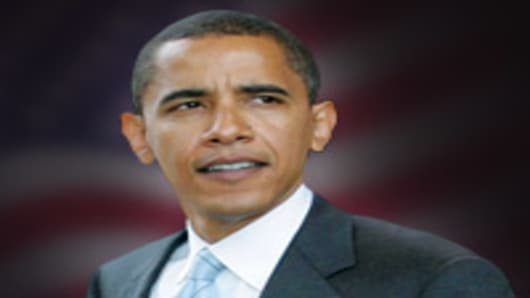President Barack Obama's re-election could mean a tough road for stocks unless there's some sign soon that he and Congress will avoid taking the economy and the country off the "fiscal cliff."
Stock futures were weaker late Tuesday but were off lows as Obama was called the winner n the tight race against Mitt Romney. Futures regained more ground when Romney conceded, removing the chance of a challenge that would cloud the outcome and lead to a period of uncertainty. Democrats also retained control of the Senate, leaving in place a divided Congress.
(Read More: Obama Beats Romney, Wins Re-election as US President)
"I clearly thought that a status quo election was negative," said Barry Knapp, head of equity portfolio strategy at Barclays. "We've had business confidence falling sharply. We've had capital spending contract. You can see it in the performance of tech stocks and industrials and in corporate earnings, and I think this is a negative outcome."
The fiscal cliff is the dual expiration of Bush-era tax cuts and the beginning of automatic spending cuts that take place starting Jan. 1 if there is no action by Congress. The spending cuts were agreed as part of the Congressional compromise on the debt ceiling and were viewed as so onerous that they would force Congress to act.
(Read More: Why CEOs Are on the 'Fiscal Cliff' Warpath)
Already on Tuesday, Speaker John Boehner said that voters made clear there is no mandate for higher taxes, by keeping Republicans in control of the House.
"I think the government looks very polarized, and the probably of going off the fiscal cliff goes up, and the outlook or the market looks negative. I don't see any silver lining in it," said Knapp. "This doesn't' look like the government coming toward the middle to me. A divided government with hardened positions. Who knows, maybe the president wakes up and says my political career is over and he wants to be the great healer."
Wall Street had favored Romney and the Republican ticket in part because it preferred their approach of retaining tax cuts, and making spending cuts. The Obama Administration favors raising taxes on the richest Americans, and also increasing capital gains and dividend taxes.
"The market is going down. The market does not want another four years of Obama. It does not want these tax hikes on a fragile economy," said Peter Boockvar, Miller Tabak strategist. "We have an economy that's barely staying above recession. Europe's problems are deepening. Now we have the prospect of higher taxes."
Art Hogan of Lazard Capital Partners said the market was also very concerned that there would be a clear outcome to the election, and not having it drag on as it did in 2000. Now the focus will shift.
(Read More: Get Ready for Cheap Money 'Run Amok': Rogers)
"We're going to need a clear path for cooperating here and a quick victory for Obama doesn't lend itself to that," Hogan said. "It's interesting to see if Obama in a second term will be caring about his legacy and not wanting to be the president with not just one but two downgrades by credit agencies."
The U.S. was downgraded by Standard and Poor's after the debt ceiling battle in August, 2011, when Congress failed to take major steps to address the country's fiscal problems. There is concern that the failure to find a path to tackle the fiscal issues will result in another downgrade of the U.S. credit rating.
As Congress struggles with the cliff, the Fed will continue its easing programs, which were criticized by Romney and his running mate, Rep. Paul Ryan, R-Wis. "Gold is hanging in because Bernanke will keep doing it," said Boockvar. "With Obama, it's still certainly a green light."
Stocks bounced on Tuesday on relief that the election would bring an end to uncertainty. There was also some speculation that perhaps Romney could pull off a victory and stocks that would do better under Republicans moved higher.
The Dow was up 1 percent at 13,245, and the S&P was up 0.8 percent at 1428. Dow futures were down triple digits Tuesday evening before recovering.
Follow Patti Domm on Twitter: @pattidomm
Questions? Comments? Email us at marketinsider@cnbc.com



